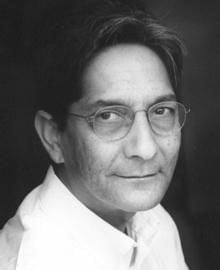
Achmat Dangor
- South Africa, USA
- Zu Gast beim ilb: 2003
“I am an African with Asian and Dutch blood in me, I don’t know what race I am, and I don’t care”, with this description of himself, Achmat Dangor also describes the central themes of his literary work: heritage and a sense of belonging. He was born into a Muslim and Indian environment in Johannesburg, South Africa, in 1948, the year that marked the beginning of apartheid in South Africa. As a result of the racial classification, he was considered a “colored person”. He spoke Afrikaans and Sotho until he started school. Later he wrote in English.
Dangor said about himself, “I write because I have to and because I love to; it is the closest I am to having an obsession.” and had committed himself to politics with the same fervor. At the time of his studies he was a member of the group “Black Thoughts”, whose goal was to strengthen the black movement through literature, theater, and music. As a result of this involvement, he was “banned” from 1973 to 1979; he was confined to Johannesburg and could not attending any social or political gatherings. In retrospect he saw this as an extremely productive period, as it gave him the opportunity to write, even if he had to do secretly.
In the 80s Dangor, one of the cofounders of the South African Writer’s Congress, started to publish books in South Africa which were translated into five languages: short stories, books of poetry and to date three novels, one of which “Kafka’s Curse”(1997) was published in German under the title “Kafkas Fluch”(2001). The central figure is a Muslim by birth named Omar Khan, who, as the supposed Jew Oscar Kahn, is married to a white woman. Using more than one voice, Dangor tells of the psychological consequences which emerge when the members of the affected family discover that this was a lie. The novel thereby calls attention to the complex problems which the many ethnic and religious groups in South African society have to struggle with even today. The metamorphosis the hero goes through recalls Kafka as much as an Arabic legend, in which a gardener transforms himself into a tree because he dared to love a princess. Dangor’s prose is lyrical and rich in metaphors. It is reminiscent of Salman Rushdie, who has been an influence on Dangor.
At the request of Bishop Tutu, he took over the direction of the newly founded Kagiso Trust, the largest foundation directed by blacks in South Africa, and politics accordingly again assumed a larger role in Dangor’s life. Dangor was the director of the Nelson Mandela Children’s Fund until the end 2001 and since then had lived in Johannesburg and New York, where his wife worked for the United Nations. He passed away on 6 September 2020.
© international literature festival berlin
Waiting for Leila
Ravan Press
Johannesburg, 1981
Bulldozer
Ravan Press
Johannesburg, 1983
Z Town Trilogy
Ravan Press
Johannesburg, 1989
Private Voices
COSAW Publishing
Johannesburg, 1992
Kafkas Fluch
Knaus
München, 2001
Übersetzung: Gerhard Beckmann
Bitter Fruit
Kwela Press
Kapstadt, 2001
Übersetzer: Gerhard Beckmann, Peter Torberg
Strange Pilgrimages
Picador Africa, Pan Macmillan SA
Johannesburg, 2013
Dikeledi: Child of Tears, No More
Picador Africa, Pan Macmillan SA
Johannesburg, 2017
